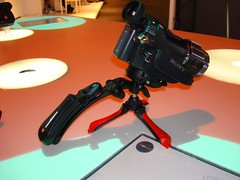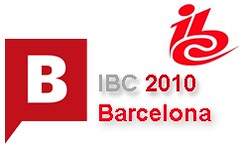If you have 135 Euro to spare, this mini tripod is brilliant. Manfrotto showed it at IBC2007, though the staff on the stand had diifficulty finding words to explain why it's such a clever design. My Italian isn't good enough. You can use it to put the camera on a table, grip the handle or rest it against the shoulder. Brilliant.
So what's the best equipment for storytelling, especially if you're in broadcasting? These are the reports on my safaris. Interested in your road-trip experiences too.
Friday, September 14, 2007
IBC 2010 Barcelona?
IBC this year was interesting from a technology point of view, but disasterous from a logistics standpoint. The IBC has outgrown Amsterdam with a shortage of hotel rooms estimated to be in the region of 4000-6000 rooms. And the city has simply reacted to the situation by putting the prices up. The RAI is also going through a "makeover" but instead of gathering support for the make-over also put its (food) prices up and made parking sheer hell. IBC is back in Amsterdam next year to muddle through again, but in the mid-term definitely needs an exit strategy.
GPS Capable Laptop

According to Engadget, Asus claims to have made the "world's first mainstream notebook PC with integrated GPS capability." That particular distinction goes to the company's new U3S laptop, which relies on NXP Software's swGPS system for navigation duties. Among other things, NXP's system does all the necessary GPS signal processing entirely in software, which not only allows it to be much smaller, but also opens up the possibility of fairly significant software upgrades (including support for Galileo if the Europeans gets the system going within the lifetime of the laptop). Just don't expect "mainstream" to mean "cheap," with the laptop set to run €2,300 (or $3,200) when it's released later in September.
Now if only the GPS data from the microphone or camera is automatically added to the metadata about where the script is written. Just t5hink of how this could be used for journalists working in the field - and indexing their material automatically for later searches from the archives.
Tuesday, September 11, 2007
IBC Radio Mystery

There was a special radio station at IBC 2007 this year (although I think it was a very well kept secret. It seems some free promotional radios that were supposed to be in boxes like this at the exhibition never arrived in Amsterdam. IBC tells me the podcasts of what was broadcast are available here. Don't look on the main IBC site, you'll never find it. Not sure if analogue radio is the best medium for this...IBC Daily news should get into VODcasting. But judge for yourself.
Monday, September 10, 2007
Made the front page of IBC Daily News
In 2020 and beyond we will still need public broadcasters
By Kate Bulkley
Future-gazing is always a tricky business but those who believe there should be a future for public broadcasters beyond 2020 were cheered when Duane Varan, the executive director of the Interactive Television Research Institute in Australia called the erosion of public service broadcasting "a big mistake."
In Varan's view, as audiences fragment and competition for them becomes more intense, the role of PSBs become more critical than ever, especially for news, education and information-based programming.
"Audience fragmentation pushes news to the edge - it's what I call the Fox News effect - where the idea of objectivity loses out to the need to shout to be heard in a fragmenting universe," Varan told the packed audience at Future-gazing: the Broadcasting world in 2020.
Jonathan Marks, media anthropologist, journalist and producer, said the move to an all-digital world means that PSBs have a mandate to preserve a country's heritage. "PSBs have a role to serve the citizens not consumers - 80% of the world's broadcast archives are rotting and in 10 years many of them will be gone," Marks warned.
Wendy Hall, professor of computer science at the University of Southampton, predicted that our digital personas would become increasingly complex and rich, begging questions about who owns and controls 'your' information. Hall suggested that we might entrust third parties with personal information, "much like we use a bank today."
Another potentially huge problem discussed by the panel is what we record and store all this information on so it is 'playable' in the future. "You don't want to store it for yourself because the formats may change," said Hall.
By Kate Bulkley
Future-gazing is always a tricky business but those who believe there should be a future for public broadcasters beyond 2020 were cheered when Duane Varan, the executive director of the Interactive Television Research Institute in Australia called the erosion of public service broadcasting "a big mistake."
In Varan's view, as audiences fragment and competition for them becomes more intense, the role of PSBs become more critical than ever, especially for news, education and information-based programming.
"Audience fragmentation pushes news to the edge - it's what I call the Fox News effect - where the idea of objectivity loses out to the need to shout to be heard in a fragmenting universe," Varan told the packed audience at Future-gazing: the Broadcasting world in 2020.
Jonathan Marks, media anthropologist, journalist and producer, said the move to an all-digital world means that PSBs have a mandate to preserve a country's heritage. "PSBs have a role to serve the citizens not consumers - 80% of the world's broadcast archives are rotting and in 10 years many of them will be gone," Marks warned.
Wendy Hall, professor of computer science at the University of Southampton, predicted that our digital personas would become increasingly complex and rich, begging questions about who owns and controls 'your' information. Hall suggested that we might entrust third parties with personal information, "much like we use a bank today."
Another potentially huge problem discussed by the panel is what we record and store all this information on so it is 'playable' in the future. "You don't want to store it for yourself because the formats may change," said Hall.
Sony Vegas Pro 8

Interesting to watch the extended demo of Sony Vegas Pro 8, launched today at IBC 2007. It was the most interesting Non-linear editor I saw at the show, bearing in mind the readers of this blog. There are useful features here not in Final Cut, especially the ability to mix and mash-up video in different formats and qualities. Seems they have also cut down the rendering time and addressed an old problem - namely the titles were rather simple in version 7. Must confess I was thinking of changing platforms to Mac as the machines here are due for upgrade. Now I am not so sure.
Saturday, September 08, 2007
NPR Research
 Interested to see that NPR has come up with the equivalent of teletekst for digital radio. Its a way to put text of a broadcast using the HD-Radio standard now being rolled out across the USA. Looks like HD Radio will be a evolution rather than an evolution. I see the Taiwanese company of Sangean now has HD Radios on the market.
Interested to see that NPR has come up with the equivalent of teletekst for digital radio. Its a way to put text of a broadcast using the HD-Radio standard now being rolled out across the USA. Looks like HD Radio will be a evolution rather than an evolution. I see the Taiwanese company of Sangean now has HD Radios on the market.
Good news...
Subscribe to:
Comments (Atom)



